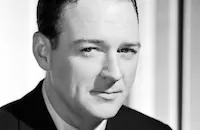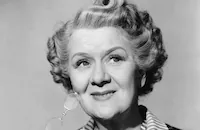The Bells of St. Mary's

Brief Synopsis
Cast & Crew
Leo Mccarey
Bing Crosby
Ingrid Bergman
Henry Travers
William Gargan
Ruth Donnelly
Film Details
Technical Specs

Synopsis
When Father O'Malley is designated priest of St. Mary's church and its concomitant elementary school, he is warned that the strong-willed nuns drove the previous priest into a rest home. Unfamiliar with the precepts of running a school, O'Malley incurs the disapproval of Swedish American Sister Mary Benedict, the Mother Superior and school principal, when as his first official act, he grants the students a holiday. As Sister Benedict escorts O'Malley on a tour of the dilapidated school building, she points to the building under construction across the way and confesses that it is her dream to have its owner, wealthy, old curmudgeon Horace P. Bogardus, donate his building to the church. Later, O'Malley meets Bogardus when he complains about the children playing on the fence surrounding his building. Bogardus warns O'Malley that unless the church agrees to sell him the school to use as a parking lot, he will ensure that the city council will condemn it. After leaving Bogardus, O'Malley is approached by a desperate woman, who begs the priest to allow her little daughter Patsy to attend the school. The woman, full of self-recrimination, relates the sad story of how her husband, a musician named Joe Gallagher, deserted her soon after the birth of their child and how she has had to depend on the generosity of men to support her young daughter. Sympathetic, O'Malley agrees to care for the troubled Patsy, who experiences difficulty adjusting to the school. As the office building nears completion, Sister Benedict visits Bogardus in his new quarters and envisions a modern classroom and gymnasium there. Overworked and aggravated, Bogardus is then paid a housecall by his physician, Dr. McKay. As the doctor is recommending relaxation and rest, Bogardus recoils at the sound of the school choir across the schoolyard and slams the window shut, causing it to shatter. One day, O'Malley visits Patsy's mother with news that he has located her husband, who is now anxiously waiting to meet her in the hallway. Mrs. Gallagher runs into the hall, and the couple is reunited after being separated for many years. At the same time, Patsy, excited at the thought of her upcoming graduation, goes to visit her mother to show off her commencement dress. Spotting her mother speaking to Gallagher, Patsy believes that he is one of her mother's clients and flees the building. Patsy fails her exams, but O'Malley urges Sister Benedict to pass the girl in order to boost her confidence. The sister adamantly refuses, however, arguing that the school must maintain its standards. Informed that she has failed her courses, Patsy somberly returns her graduation dress. Soon after, Sister Benedict becomes ill and O'Malley sends for Dr. McKay. As they await the doctor's arrival, Sister Benedict chides O'Malley for writing to the Mother General about Patsy. Although Sister Benedict protests that she is just tired and demoralized by her inability to save St. Mary's, the doctor insists on examining her in his office the next day. On the doctor's way out, O'Malley questions him about Bogardus' heart condition and suggests that good deeds can cure a bad heart. The next day, O'Malley meets Bogardus after he has just visited his physician. Bogardus is preoccupied by the doctor's diagnosis of his condition, but is consoled by O'Malley, who encourages him to perform good deeds. Taking the priest's advice, Bogardus dashes into the street to save a stray dog. After ushering an elderly woman onto her bus, Bogardus then proceeds to the church. Astonished by the sight of Bogardus bowed in prayer, Sister Benedict approaches him and, after confessing that he has acted selfishly, he offers the nun his new building to use as a school, making her giddy with happiness. The good news is soon clouded by Dr. McKay's diagnosis that Sister Benedict is suffering from the early stages of tuberculosis and should be sent to a dry climate and relieved of all strenuous duties. Although the doctor cautions O'Malley to keep the sister's condition secret from her, the priest fears that sending her away without an explanation will lead her to believe that she was transferred at his behest. As the sister arranges the furniture in the new classroom, O'Malley notifies her that she is being transferred, causing her to react with disbelief and sorrow that she will no longer be working with children. Soon after, the girls prepare for their commencement ceremony as Patsy watches longingly in the distance. Upon seeing her mother and her male escort enter the schoolyard, she ducks behind a post to hide, and when Sister Benedict observes her actions, she realizes that Patsy never told her mother that she has failed. Anguished, Patsy asks for the nun's help and admits that she deliberately failed so that she could remain at the school. When O'Malley introduces Patsy's parents to Sister Benedict, Patsy is dumbfounded to learn that the stranger is actually her father. After Mrs. Gallagher promises Patsy a real home and a new life, O'Malley remarks that the couple has come to watch their daughter graduate. Finally comprehending the enormous handicap under which Patsy has suffered, Sister Benedict relents and allows the girl to graduate. After the ceremony, Sister Benedict visits the chapel one last time to pray for guidance. When she departs, bent in sorrow, O'Malley, overwhelmed with compassion, tells her the truth about her condition. Immensely relieved, the sister fills with joy as she bids farewell to the priest.

Director

Leo Mccarey
Cast

Bing Crosby

Ingrid Bergman

Henry Travers

William Gargan

Ruth Donnelly

Joan Carroll
Martha Sleeper

Rhys Williams
Dickie Tyler

Una O'connor
Bobby Frasco
Aina Constant
Gwen Crawford
Eva Novak
Matt Mchugh
Edna Wonacott
Jimmy Crane
Tim Hawkins
George Noakes
Bobby Dolan
Michael Orr
Dewey Robinson
Jimmy Dundee
Joseph Palma
Minerva Urecal
Peter Sasso
Cora Shannon
Crew
A. Emmett Adams
George Barnes
Johnny Burke
Grant Clarke
Albert D'agostino
Robert Emmett Dolan
William Flannery
Douglas Furber
Edith Head
Eddie Lisbona
Harry Marker
Leo Mccarey
Leo Mccarey
George W. Meyer
Bob Musel
Dudley Nichols
Harry Scott
Darrell Silvera
James G. Stewart
Richard Van Hessen
James Van Heusen
John Francis Wade
Vernon L. Walker
Jack Warren

Photo Collections
Videos
Movie Clip




Trailer
Hosted Intro
Film Details
Technical Specs

Award Wins
Best Sound
Award Nominations
Best Actor
Best Actress
Best Director
Best Editing
Best Picture
Best Score
Best Song
Articles
The Bells of St. Mary's
The Bells of St. Mary's tells the further adventures of Father O'Malley (Bing Crosby) as he moves to a new parish, tangles with Sister Benedict (a beatific Ingrid Bergman) and ultimately forges a friendship with her. Along the way, songs are sung, heartstrings are tugged, Father O'Malley charms an old codger into giving the church money for a new school, and Sister Benedict teaches a boy how to box. It's sentimental hokum of the highest caliber, thanks to the performances of Crosby and Bergman, and the expert guidance of producer-director Leo McCarey.
After several serious dramatic performances, Bergman wanted to prove her versatility by playing a nun, and coaxed a reluctant David O. Selznick -- who had her under contract -- to loan her out. Bergman researched her role by visiting a convent and meeting Leo McCarey's aunt, the nun who was the inspiration for Sister Benedict.
The filming was pleasant and relaxed, and became even more so early in the production, when the Academy Awards for 1944 were handed out. Crosby and McCarey were both nominated for Going My Way, and Bergman was nominated for Best Actress for Gaslight. On Oscar® Night, McCarey won; then Crosby won. Finally, Bergman won. Accepting the award, she said "I'm particularly glad to get it this time because tomorrow I go to work in a picture with Mr. Crosby and Mr. McCarey, and I'm afraid that if I went on the set without an award, neither of them would speak to me!"
Producer/Director: Leo McCarey
Screenplay: Dudley Nichols, Leo McCarey (story)
Cinematography: George Barnes
Costume Design: Edith Head
Film Editing: Harry Marker
Original Music: Johnny Burke, Jimmy Van Heusen, Robert Emmett Dolan
Cast: Bing Crosby (Father Chuck), Ingrid Bergman (Sister Benedict), Henry Travers (Horace P. Bogardus), William Gargan (Patsy's father), Ruth Donnelly (Sister Michael), Una O'Connor (Mrs. Breen), Rhys Williams (Dr. McKay).
BW-127m Closed captioning.
by Margarita Landazuri

The Bells of St. Mary's
Quotes
Trivia
The production was overseen by a Catholic priest who served as an advisor during the shooting. While the final farewell sequence was being filmed, Bing Crosby and Ingrid Bergman decided to play a prank on him. They asked director Leo McCarey to allow one more take, and, as "Father O'Malley" and "Sister Benedict" said their last goodbyes, they embraced in a passionate kiss, while the offscreen priest-advisor jumped up roaring in protest.
Notes
According to a 1945 New York Times news item, David O. Selznick was paid $175,000 to lend Ingrid Bergman to RKO. As part of the deal, Selznick also acquired the screen rights to Little Women (see below) and A Bill of Divorcement (see AFI Catalog of Feature Films, 1931-40; F3.0338). This was the first effort of Rainbow Productions, Inc., an independent production company owned by Leo McCarey, Bing Crosby, B. G. DeSylva, David Butler and Hal Roach, Jr. According to a 1944 news item in New York Times, in 1942, McCarey, who was at the time under contract to RKO, outlined the story to Crosby, who was intrigued but unavailable because of his contract with Paramount. Crosby was freed to make the picture when DeSylva, then an executive producer at Paramount, agreed to lend Crosby to RKO in exchange for a commitment with McCarey, who then wrote and directed Going My Way for Paramount (see below). Crosby first played the role of "Father O'Malley" in Going My Way, which was released prior to The Bells of St. Mary's and won an Academy Award for his performance in Going My Way. The Hollywood Reporter review adds that McCarey based Bergman's character on his aunt, Sister Mary Benedict of the Immaculate Heart Convent in Hollywood, CA.
Hollywood Reporter news items yield the following information: In February 1945, Anna Q. Nilsson was tested for one of the leads. The closing street scene was shot on Paramount's New York street set. Although an April 1945 news item places Myra Nelson and Marion Lessing in the cast, their participation in the released film has not been confirmed. Bobby Dolan, the little boy who narrated the nativity scene in the film, was the son of Robert Emmett Dolan, the film's musical director. The film was nominated for the following Academy Awards: Best Picture, Best Actor, Best Actress, Best Director, Best Film Editor, Best Score and Best Song ("Aren't You Glad You're You"). It won the Academy Award for Best Sound Recording. According to a modern source, the film became the year's top box-office picture and was the biggest hit in RKO history. In the 1950s, Republic acquired the picture for its film library and re-issued it in 1959. On October 7, 1959, CBS broadcast a televised version of the story, starring Claudette Colbert, Robert Preston and Glenda Farrell.
















